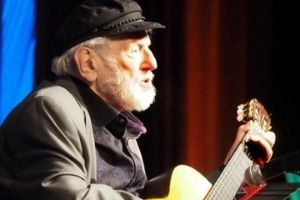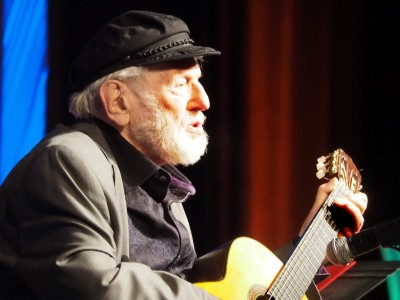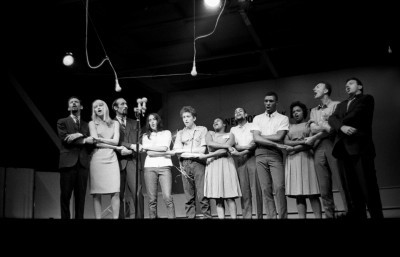Remembering Lives Touched

Theodore Bikel 1924-2015

There are many contexts for remembering Theodore Bikel, the multi-talented entertainer and activist who passed away yesterday. Many of the tributes I’ve seen on-line, speak to his many performances on stage and screen in roles as ranging from a regimented Austrian navy officer (in Broadway’s The Sound of Music) to a compassionate rabbi in outer space (on TV’s Babylon 5). But for the last six weeks, the context in which I have been thinking about Theodore Bikel involves Paul Simon – and that requires more than a little explanation.
On October 11th the Jewish Museum of Maryland will be privileged to be the first venue of a traveling biographical exhibit on the life of one of America’s most beloved singer-songwriters, Paul Simon: Words and Music. Developed by the Rock and Roll Hall of Fame, the exhibit chronicles the whole career of this musical icon – including his first guitar, clips from his performances on Saturday Night Live, and draft lyrics of songs like Mrs. Robinson – sometimes literally written on the back of an envelope. The show also features a series of narrative interviews drawn from three hours of conversation with Simon created especially for this exhibition.
The exhibit would be worth seeing at any venue, but since it is here at the Jewish Museum of Maryland, we decided to add an extra dimension. We are creating a small companion “pop-up” exhibit exploring the role of people of Jewish heritage in the American folk revival and the evolution of folk-rock in the 1950s and 1960s. We began this effort with the observation that a disproportionate number of the great folk singer-songwriters (Paul Simon, Bob Dylan, Leonard Cohen, Phil Ochs among others) came from middle-class Jewish homes. But as we researched further we learned that there were so many more links and connections not just with performers but with the forces behind the scenes that propelled this musical genre.
And that’s why I’ve been reading a lot about Theodore Bikel in the last couple of months. Growing up, I thought of Bikel’s folk albums as something belonging to my older sister’s generation – old-timey tunes from around the globe – music that had little to do with the younger performers that I listened to.
In a way, Bikel’s own modesty about the scope of his work reinforced that image. Here is a quote from his autobiography that we’re using in the exhibit:
A folksinger is one whose material is drawn from one idiom based on the roots of his own tribe, his own people, his own heritage. Although I sing in twenty-one languages, I can legitimately call myself a folksinger in just one idiom – the Jewish one… it was something of a tightrope act, being a keeper of Jewish tradition on the one hand and doing the multicultural thing on the other…
From Theo, The Autobiography of Theodore Bikel (Harper Collins, 1994)
But the lives Bikel touched went way beyond his “one idiom”. Let me share just three examples of the way he shaped American folk music: The Byrds, Bob Dylan and Judy Collins.
From an interview with Roger McGuinn:
ROGER: After a while at the Old Town School, I got good enough to get a job playing folk songs at a coffeehouse on Rush Street in Chicago for 10 dollars a night. When I’d finish the evening at the coffeehouse, I’d go down to the place where all the professional folk singers played: The Gate of Horn.
One night there was a jam session going on at The Gate of Horn. There were The Limeliters and Theodore Bikel. They had a lot of guitars going and asked me to play my banjo. At 5 o’clock in the morning, Alex Hassilev of the Limeliters asked me if I wanted a job playing for them. “Yes!” I said, and he gave me an album and told me to learn the songs and meet them at 1 o’clock the next afternoon for an audition.
So I took the album home and stayed up the rest of the night learning the songs. The next day I met them and got through the audition. Alex said, “Great! You got the job. When can you start?”
“I get out of high school in June,” I said sheepishly.
“High school!” Alex asked in disbelief. “Didn’t we meet you in a bar last night?”
I told them how the bartender let me in because I played music and didn’t make any trouble.
In June they sent a plane ticket and I flew to Los Angeles to record Tonight in Person with them for RCA Records.
—————————-
In 1959 Bikel co-founded the Newport Folk Festival (together with Pete Seeger, Oscar Brand, and George Wein). Here is a piece of his interview about the moment when folk went electric:
DAN EPSTEIN: It’s interesting to read your perspective on Bob Dylan’s “electric” performance at the Newport Folk Festival in 1965. Your reaction to it was more measured than, say, Pete Seeger’s was, but you were still clearly upset by the incident.
THEODORE BIKEL: Yeah, I was upset. But I also knew that this music had somewhere to go — it just wasn’t right for Newport, and for the folk festival that we were running. I also didn’t like the idea that Bob Dylan, who was idealized by so many of the people in the audience, would be booed offstage. Nobody likes to hear that sound! I mean, when he came offstage, he was white in the face and trembling. And I said to him, “Bobby, if a person rides on a horse and gets thrown from the horse, unless he gets back on the horse he’ll never ride again. So I suggest you get out there with an acoustic guitar, and give them the Bob Dylan they came to hear.” And he did that. Of course, he was in the mode of a declaration of independence; what he sang with the electronic band was, “I ain’t gonna work on Maggie’s farm no more,” which is a declaration of independence. And then, when he went out there with his acoustic guitar, he sang, “It’s All Over Now, Baby Blue,” which is just as much of a declaration of independence.
Finally, I turn to Jac Holzman’s company bio – Following the Music: The Life and High Times of Elektra Records in the Great Years of American Pop Culture. Holzman, who created his record label while in still in college (using his bar mitzvah money) gives credit to Bikel’s popular albums for keeping the company afloat during lean years from 1956 to 1961. In this way, all the great artists on Elektra – all the way up to The Doors, owe a piece of their success to Theodore Bikel. But the book relates one particular story:
THEODORE BIKEL: Jac said, “You have a Carnegie Hall concert coming up. Why don’t you introduce Judy?” I listened to her at the Bitter End and she was lovely with a gorgeous voice. So I said, “Sure.”
JUDY COLLINS: Theo gave me a big break, because that was an important concert. He was very sweet to me always. He’s a very good man.
There are many reasons to appreciate Theodore Bikel – not just what he accomplished, but what he enabled others to accomplish.

